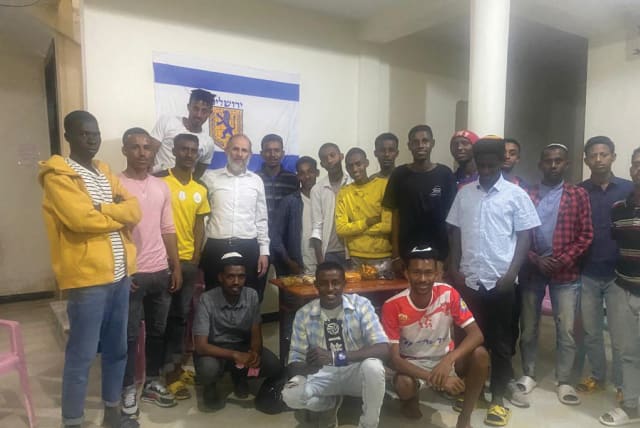Israel must stop its racism and save Ethiopian Jews - opinion

The last Jewish community, which was first exiled 2,000 years ago, is refused aliyah. And who is the refuser? The State of Israel!
To judge a person, one must walk a mile in his shoes – but more importantly, in order to feel affection for him or her, one must feel their distress.
Imagine that you have brothers, sisters, parents, or cousins who are stuck in a war zone under life-threatening circumstances, as is the case of many Ethiopian Israelis today.
Thousands of these relatives have been living in transit camps in Gondar and Addis Ababa for many years. They are assirei hatikvah (prisoners of hope) who are making aliyah bit by bit. Many of them are Jews according to Halacha, and others are descendants of zera Israel (“the seed of Israel,” meaning by patrilineal descent) who live as Jews.
More than 1,000 out of the 4,226 applicants have already been found to be eligible for aliyah; they meet the criteria set by the State of Israel for the right of aliyah.
Now their lives are in danger. Not only are they prisoners of hope, but they are hostages in a war that is not theirs. There are women who were left behind with their children when their husbands made their way to Israel; siblings or children who did not make the quotas for aliyah while parents and other family members were brought on aliyah.
Imagine this happening to you. Imagine feeling that not only is your family torn in two, but those who have been left behind are in mortal danger.
THE STORY of the Jewish remnants in Ethiopia is one that has been a part of the State of Israel for decades. It is a difficult and painful subject, but it is enough to visit the communities for just a few days to understand how great this injustice is.
Israel refuses the last Jewish exiles
The last Jewish community, which was first exiled 2,000 years ago, is refused aliyah. And who is the refuser? The State of Israel! We could have been grateful to the state that has opened its gates to many thousands from this community, if not for the fact that within the gates is racism, separation of families, and contempt from ill-spoken official “gatekeepers” and politicians who are unwilling to educate themselves about the issue in a serious manner.
These days, the State of Israel is facing many challenges that are deepening the civil-social rift. I heard one of the leaders of the demonstrations against the judicial reform speak against Ethiopian Israelis for not joining the demonstrations on Kaplan Street in Tel Aviv. I wondered if she had joined the demonstration for the aliyah of Ethiopian Jewry, now in grave danger.
Let us stand up for our brothers in their hour of need. They are only a few thousand, many of whom meet the criteria set by the Israeli government for aliyah. All that has to be done is to apply the government’s decisions in order to set right much of this great injustice.
A few years ago, in a meeting with Israeli Prime Minister Benjamin Netanyahu, we felt his empathy for Ethiopian aliyah, and his desire to solve the situation. We also heard his frustration at his government for not sharing the same sentiment.
At the end of all prisoners of hope synagogue services, those waiting in Ethiopia for aliyah sing “Am Israel chai” and “Hatikvah.” They hold onto the faith of Israel and the connection to the land of Israel. Thousands have already died over the years while waiting, but those who remain will not cease to long for Zion and for Jerusalem.
The government decisions have already been made, they need only to be implemented, immediately.
Now is a time of great troubles, and alongside it, a great opportunity to stop one of the historical injustices of the State of Israel. We call on the prime minister, now, precisely when attention is directed toward other matters, to look upon the state of our brethren, and bring them home, to Israel.
The writer, a rabbi, is head of the Machanaim Yeshiva and committee head of rabbis and kessim for Ethiopian Jewry.
Jerusalem Post Store
`; document.getElementById("linkPremium").innerHTML = cont; var divWithLink = document.getElementById("premium-link"); if (divWithLink !== null && divWithLink !== 'undefined') { divWithLink.style.border = "solid 1px #cb0f3e"; divWithLink.style.textAlign = "center"; divWithLink.style.marginBottom = "15px"; divWithLink.style.marginTop = "15px"; divWithLink.style.width = "100%"; divWithLink.style.backgroundColor = "#122952"; divWithLink.style.color = "#ffffff"; divWithLink.style.lineHeight = "1.5"; } } (function (v, i) { });

